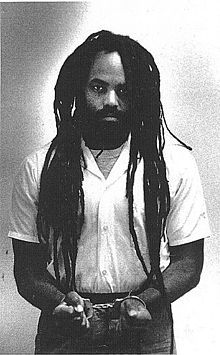
Mumia Abu-Jamal
After nearly thirty years of lies, public deception and at times blatantly perjured testimony, the supporters of cop-killer Mumia Abu-Jamal have finally saved him from the death penalty. The big question now is why not parole him...with strings?

Mumia Abu-Jamal
If the suggestion that Mumia Abu-Jamal should be paroled sounds offensive to some people, especially to the widow of the slain officer, Maureen Faulkner, let us consider this in a cold, rational manner. First, the death penalty is not universally popular; although it is in force in the majority of American states, it can only be said to be applied with any enthusiasm in Texas, and to very much lesser degrees in half a dozen or so others, as this table demonstrates.
It is clear that Mumia should have been executed years or decades ago, but while his supporters are celebrating, spending the best part of thirty years in a condemned manís cell under heavy security, hardly ever seeing daylight, and with no access to the things most of us take for granted is a victory in what sense?
The abolition of the death penalty means that in practice there are only two ways to deal with convicted murderers, either they must be locked up forever, or at some point in time they will be released. Most murderers serve considerably less than thirty years, even those who have been convicted of particularly heinous crimes. While murder is by definition inexcusable, on a scale of 1 to 100, just how heinous was the murder of Daniel Faulkner? Abu-Jamal is not a sex killer or a child killer, his crime was even less heinous than the murder of Clarke Pearce by Satpal Ram. Ram murdered Pearce in the small hours of November 16, 1986, was arrested November 24 – after surrendering to the police with his solicitor – was convicted and gaoled on June 10, 1987, and after two failed appeals was paroled on June 18, 2002.
The fact that he was subsequently arrested and sent back to gaol for breaching his life licence is not the point. Some murderers serve less time than Ram; their case may be atypical, but Robert Thompson and Jon Venables didnít serve any prison time at all, although like Ram, Venables didnít appreciate the second chance he was given. Stafford and Luvaglio were also treated extremely leniently, especially when one considers they committed a premeditated murder.
In Britain, convicted murderers and other life sentence prisoners are paroled only with strings attached. One is that if their behaviour gives cause for concern, they can be returned to gaol without being charged much less convicted of any offence. Whether or not this sort of treatment amounts to a violation of natural justice is neither here nor there.
The question is, if Abu-Jamal is paroled, on what terms? Generally in Britain, before a murderer is paroled he must face up to if not admit his guilt, but this is not a precondition; Stafford and Luvaglio did not, neither did Ram. What though if Mumia were to be paroled on condition that he does something he has not done before, explain his actions that night? He has never done this, unless of course one makes an exception for this arrant nonsense concocted by Abu-Jamal and his brother William Cook, and probably quite a few co-conspirators.
Most of all, before any parole application is entertained, he should be made to explain the elephant in the courtroom, in particular the gun registered to him that was found out of its holster, together with the five spent casings. If he is unable or unwilling to explain that – namely that he shot Officer Faulkner – then he should be left to rot.
When the truth about innocent, martyred Mumia is disseminated to a wider public, his supporters will disappear like the morning mist. That is if the legal authorities have the courage to go down this route. There is though another possibility. Abu-Jamal may refuse to give any ground at all. Now that he is no longer on death row, he has lost his superstar status, and if he were ever to walk free, he would at some point have some real explaining to do.
[The above op-ed was first published December 9, 2011.]
Back To Digital Journal Index